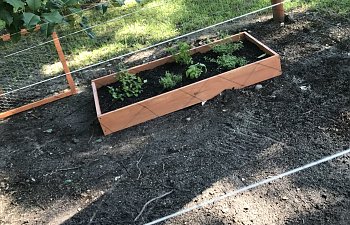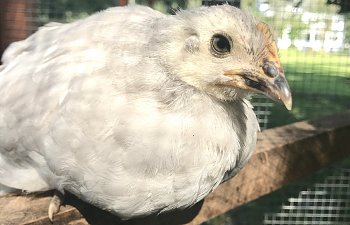Feed:
- For chicks, I give them either an organic feed from the feed store or Purina Starter-Grower medicated. With the medicated feed, I can help protect them from coccidiosis. Coccidiosis is a deadly disease in chicks and pullets, so the right protection is important. You could give them non-medicated feed as well, just watch for signs of cocci.
- For hens st about 18 weeks, I give them either Country Feeds Layer Hen crumbles or Purina omega-3 layer hen feed. It's full of the protein and calcium they need, but I still add my supplements to their feed.
- For their supplements, I give them DE, Brewers Yeast and Garlic powder, I'm going to be ordering my chicks Sea Kelp when they're older, oats, and grit. It's like Fresh Eggs Daily's Breakfast of Champion Layers, but a little different. The DE is a good year-round worm prevention, and sprinkling it around their feed and dust bath area keeps away mites and bugs. The Brewers Yeast is full of Niacin, which is essential for strong bones, especially for ducks!
- The Sea Kelp provides vitamins and minerals and improves the overall health of your flock
- The grit helps them to digest treats and grass. If your hens free-range, they will find dirt and stones, but I always add grit just in case.
- Treats should only be 10% of their diet, but it's okay to spoil them with healthy treats. Grass, weeds, herbs, cabbage, and lettuce are all good examples of healthy treats. Those can be fed in greater amounts than anything else. Treats such as bread, meat, and tomatoes should be fed in small amounts, only a few times a week. Here's a list of toxic foods to chickens.
- Avacado
- White and Red Potatoes (Sweet Potatoes are fine as they aren't part of the nightshade family)
- Eggplants
- Tomatoes (small amounts is fine, my chickens love tomatoes)
- Apple seeds
- Rhubarb
- Dried or raw beans
- Onions
- Tea Bags
- Chocolate
- Caffeine
- No moldy foods
- No overly salty/ fried
- Citrus (small amounts is fine)
- Bread (small amounts is fine
- Asparagus (small amounts is fine)
- Spinach (small amounts is fine)
- Iceberg lettuce (small amounts is fine)
- Dairy (small amounts is fine)
- For their water I use ACV, electrolytes and probiotics, Nutri-Drench, or garlic water. ACV with the "Mother" is what you should buy as it is full of the good vitamins that weren't filtered out. On hot days I'll pour a packet of save-a-chick elctrolytes into the chicks water, and for hens I'll put electrolytes in a pack made for grown chickens. I like to use probiotics in their water on the regular as it help build good bacteria in their intestines. Nutri-Drench is full of vitamins that make it good to give a sick hen, or to give your hens and chicks for a vitamin boost. Garlic cloves in their water helps to boost their immune system.
- You need to have cool or cold water for your chickens in the summer at all times, as hens can die easily from heat exhaustion. I've had that happen before, and it's terrible. In the winter, you need to check your water to make sure it's not frozen. The water freezes up overnight a lot, so you need to be waking up early to give them fresh water.
- Herbs have amazing benefits to chickens, so I always like to give them to my chickens to eat or hang them around the coop and run to make it smell nice. Here's a list on what I like to use:
- Lavender: It has a calming scent to it, making it a great choice for your nesting boxes.
- Rosemary: I love it's sharp smell and how it's able to stay fresh for days. I hang it in the coop and run.
- Basil: It's my chicken's favorite herb, and mine to! It's full of protein, aids in respiratory health, contains vitamin K, good for immune system health, and digestive system. It also helps to repel insects.
- English/German/Lemon Thyme: I have a huge english thyme bush, along with smaller bushes of lemon and german thyme. Thyme is great for respiratory health and helps to repel insects.
- Sage: Sage helps to combat salmonella, though it's not my chickens favorite herb.
- Oregano: This is one of the best herbs to give your chickens. It prevents cocci, and is a natural antibiotic. It also spreads, so I always have enough!
- Mint/Peppermint/Spearmint: It grows quite quickly and there's a lot of it, making it one of my favorite herbs for my chickens. It smells amazing, so I always hang it around the coop for smell or for them to eat. I also like to put it in their nesting boxes as a laying stimulant.
- Parsley: Stimulates egg laying, full of iron, vitamins A, B, E, C, K, it is perfect for chickens!
- It's important to watch your flock for signs of illness. Some signs are:
- Lethargey
- Pale, limp comb
- Heavy breathing
- Wheezing
- Excess sneezing
- Patchy/Mangy feathers
- Puffed up in a corner avoiding the other birds
I hope you enjoyed this article, and comment what you thought! I'm here to learn from you guys, so I can't wait to hear what you have to say! Bye!





